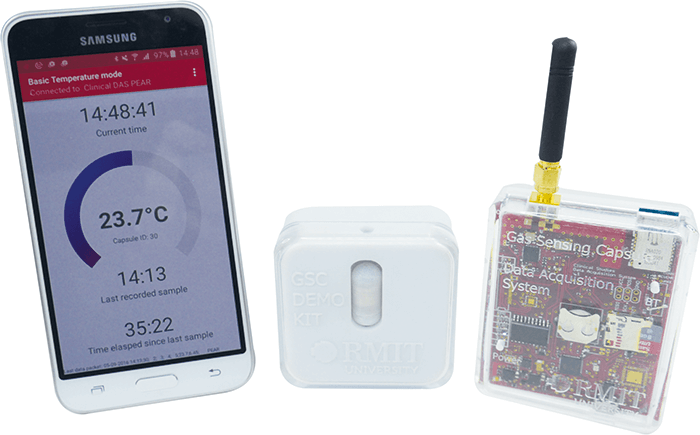
Gases in the gut – the result of both microbial and chemical activities – are closely related to an individual’s state of health. Indeed, specific gas profiles are associated with several disorders, including irritable bowel syndrome (IBS), malabsorption of carbohydrates, and small intestinal bacterial overgrowth (SIBO). Current diagnosis of these conditions can be at best limited, and at worst unreliable – as well as being invasive for the patient. A collaborative team from RMIT University and Alfred Hospital in Melbourne, Australia believe that the key to better diagnostics lies within the gut itself – and have devised an ingestible pill that can measure gases while moving through the body. “Ingestible sensors provide easier and less invasive access inside the body,” says lead author Kourosh Kalantar-Zadeh (1). “The chemicals of the gut (gases, electrolytes, metabolites, and hormones) are rapidly exchanged through the mucosa (walls) of the gut, which makes measuring chemicals in the gut as valuable as in the blood… And we all know how important the blood test is.”
The capsule operates using semi-conducting sensors and thermal conductivity. “At different temperatures, the two sensing elements become sensitive to different gases such as oxygen, hydrogen and carbon dioxide,” explains Kalantar-Zadeh. “Then we extract the concentration and type of gases using a data analysis program.” Kalantar-Zadeh and team unveiled a prototype capsule two years ago – but it has undergone considerable development since. “The pill now incorporates an oxygen sensor that shows the passage of the capsule from one segment of the gut to another, improved communication systems to reduce loss of data, a temperature sensor that shows the core temperature of the body and shows when the capsule leaves the body, and modulation of the heater for gas sensors that allows the extraction of several gases at a time and whole capsule reliability,” says Kalantar-Zadeh.
The human pilot trial has now been completed, and the group is looking for investors to finalize the Phase II trial. They have also established a company, Atmo Biosciences, to commercialize the pill. Kalantar-Zadeh says he would next like to target metabolites, and measure additional gases. However, a major hurdle is regulation. “Ingestibles are generally very safe and we have the technology to make them even safer and more reliable,” he says. “This is the beginning of a new era, when rules and regulations for using them should be significantly relaxed. We want to deliver this capsule to people in need.”
References
- J Kalantar-Zadeh et al., “A human pilot trial of ingestible electronic capsules capable of sensing different gases in the gut”, Nat Electron, 1 79-87 (2018).




